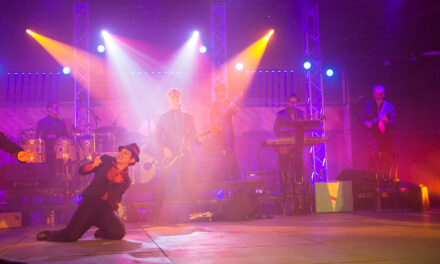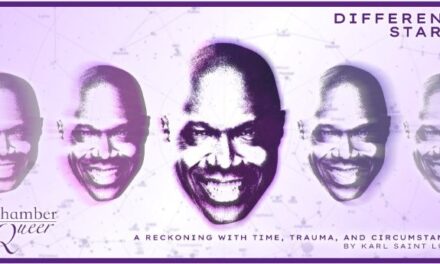If you’re a culture vulture and are interested in TV and theater, most likely, you know a lot about Krysta Rodriguez. She can be found at the MCC Theater in a play by Theresa Rebeck called Seared. She was also recently seen as “Meg” in the Public Works musical adaptation of Disney’s Hercules at the Delacorte Theater. She’s currently starring in the Netflix series, Daybreak, playing opposite Matthew Broderick and has been several well-known shows including Smash, Gossip Girl, Younger, and Inside Amy Schumer.
We sat down with her to talk about her latest theatrical role, her collaboration with Theresa Rebeck, and what it’s like to be in a roomful of women post #MeToo.
Seared is playing at the MCC until December 22.
Holly: You’ve had a massive year. Hercules. Seared. I saw you in the Jonathan Larson Project at 54 Below. And you are co-starring in the new Netflix show, Daybreak? What was a highlight?
Krysta: What was great about this year that a lot of it was planted last year. The hard work had already been done. I finished the TV show in April, and I knew that I had “Hercules” and everything coming up in August. That’s the holy grail of being an actor, knowing you have a job, and having time off. I was able to travel, and prep and have the time to do all the things I wanted to do. By the time it all rolled around, I could just lay back and enjoy it. Do the work, but appreciate how it all came to be.
Holly: Was it only last year that you were battling breast cancer? What did that teach you?
Krysta: It’s hard to be the person other people hope you are when you go through something like that. Everyone wants you to feel like a better person, and I don’t know if I do. I feel like a different person. It gave me an appreciation for what I was capable of and gave me a little less patience to do things I don’t do. My career took a significant turn in the direction I wanted it to go in, in the roles I was playing. I have always looked younger than I am, and I play young roles. The thing with breast cancer is that your femininity is in question, and you start to claim yourself as a woman. Let’s see what this woman can do.
Holly: You are now both indeed a woman in Hollywood and a woman on the NY stage. Where are you most comfortable?
Krysta: I love going back and fort. I think it’s important to miss the other part of it. It’s like a relationship where absence makes the heart grow fonder, and sometimes you need to put it aside. I feel the same way about New York. I will always feel more comfortable on stage; it’s where my love for acting started. There’s a lot about TV that you aren’t in control of. There are so many cooks in the kitchen. There’s editing that changes your performance, for example, all kinds of ways where you don’t get to pick the final product. I will always feel more comfortable stepping into a room full of people working to create the same thing. There is something very calming about that to me. But I have found joy in both places, and I am very grateful for both venues.
Holly: Where were you when the #MeToo movement started?
Krysta: I was doing another Theresa Rebeck play, What We’re Up Against, and were in the middle of rehearsals when the Harvey Weinstein story broke. We were amazed – our show was not specifically about sexual harassment – it was about women’s role in the workplace in the 1990s, which is not all that different from where we are now. We grappled with that. The #MeToo movement also added to the courage that I was talking about. I was looking at a breakdown, saying that I don’t think these characters don’t care about this woman as much as they need to. They aren’t describing her with attributes as they care; they are describing her like she’s a piece of a puzzle that is somewhat expendable. I started to get very sensitive to that, and I did start turning down work. I was fed up, quite honestly. Then things began to rise to the top that I was excited to do.
Holly: Do you find yourself working with a lot of women, and how important is that to you?
Krysta: In theater, I have found that a lot more. I have been able to be in rooms full of women. That was a shocking turn of events. It was surprising to me how much different it felt. I am in the theater right now with all men, and I love it the experience. Theresa takes excellent care of the women in her plays. So it’s not to say that being in a room full of women can’t happen, but it’s a very different experience. The goal is to have all of it.
Holly: You’ve worked with Theresa Rebeck so often on various projects. We are huge fans of her work, and I’ve profiled her in the past. Can you please talk about your relationship with her?
Krysta: My first interaction with her was around What We’re Up Against. I had done a reading with her many years ago, a one-day thing. I got cast in the play because of Adrienne Campbell-Holt, the director and then Theresa signed off on it. That was another room where a group of women was able to open about our experiences as women. That gave us all an appreciation of where we had come from and what we wanted to see. Theresa is indeed a feminist writer. She makes her female characters just as complicated as men. You want that as an actor. You wish there were more women heroes and she’s making a different kind of female hero. When I read her plays, I get very excited that someone wants me to play these roles. Then I went in and auditioned for Seared in Williamstown, and the director liked me, and Theresa approved. I’ve been able to get into the room in other ways. She believes in my ability and the way I tell her story as a woman. We’ve had similar experiences about being unapologetic and where that gets you. In earlier years, that didn’t get you very far as a woman, and now, in unpacking all of it, I might be seen in a different light. I also think that Theresa is seen in a different light, and that is exciting.
Holly: Let’s first talk about Seared and your character, Emily. Do you connect with her or share any similarities? You must connect with the stress of working in a restaurant as there is so much stress being on stage.
Krysta: I share some similarities. Emily operates on a more optimistic level that I do. She gets what she wants by being energetic and keeps moving forward with no apologies. She’s PR, so she’s always spinning. That’s not something that I do; I am more of a realist on certain levels. I do relate to her non-stoppedness and ability to move faster than anyone else in the room. To say just come with me, I got it. Whereas Harry thinks he knows the answer but spins everyone in circles until they are dizzy and think he is right. Emily is going to barrel forward and say follow me and walk in a straight line and be very efficient. I have a similarity in that I move fast and want everyone to trust me.
Holly: Emily has a knack for building a business, but she also falls for the chef. I was unclear how their relationship unfolded after the critic comes in. Does she fall in love with him, or is she a person who is more interested in her career?
Krysta: I don’t think she fell in love with him. The two of them have similar sensibilities in that they have very little time and are barely looking at a person. She says it very clear that it’s a restaurant and things happen. They get heated and get more heat. You’re there all the time, 18 hours a day, you’re cooking, and it’s intimate. They just scratched an itch. It’s fun, available to them at that time. But I do think that his talents enamor her. She thinks he’s fabulous. The way he describes his work is very attractive to her on a base level but also on a work level. Like I can print that and it will look good on paper. He’s crass but beautiful, and that excited her. He can’t spin her like he can others. They just get out of that way. I love that about the play that we don’t have to watch it happen. It happens during intermission. We don’t have to care that much about this part of the relationship. The story goes on; she starts to see the beauty; all the stuff she thought was beautiful in the beginning, is destructive. She has to keep the restaurant going and not go on journeys with him. She has to preserve the business, which is her primary goal.
Holly: Daybreak is a big hit with teens, who will undoubtedly come see you in your plays. Are you hopeful for a season two?
Krysta: Yes, we should find out very soon. I want to go back. It’s a big part of the changes I made as an actor, even before the show came out, part of the changes I made in my life. As far as the show is concerned, it’s popular with teens. I’m proud of the show. It’s a very diverse program.
This post was written by the author in their personal capacity.The opinions expressed in this article are the author’s own and do not reflect the view of The Theatre Times, their staff or collaborators.
This post was written by Holly Rosen Fink.
The views expressed here belong to the author and do not necessarily reflect our views and opinions.


















